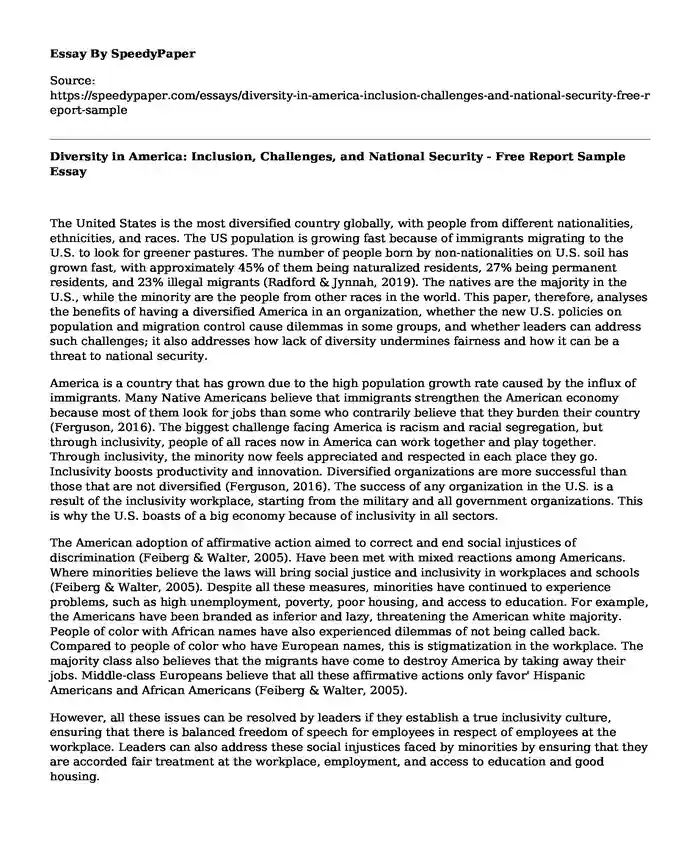
| Type of paper: | Essay |
| Categories: | United States National security |
| Pages: | 3 |
| Wordcount: | 776 words |
The United States is the most diversified country globally, with people from different nationalities, ethnicities, and races. The US population is growing fast because of immigrants migrating to the U.S. to look for greener pastures. The number of people born by non-nationalities on U.S. soil has grown fast, with approximately 45% of them being naturalized residents, 27% being permanent residents, and 23% illegal migrants (Radford & Jynnah, 2019). The natives are the majority in the U.S., while the minority are the people from other races in the world. This paper, therefore, analyses the benefits of having a diversified America in an organization, whether the new U.S. policies on population and migration control cause dilemmas in some groups, and whether leaders can address such challenges; it also addresses how lack of diversity undermines fairness and how it can be a threat to national security.
America is a country that has grown due to the high population growth rate caused by the influx of immigrants. Many Native Americans believe that immigrants strengthen the American economy because most of them look for jobs than some who contrarily believe that they burden their country (Ferguson, 2016). The biggest challenge facing America is racism and racial segregation, but through inclusivity, people of all races now in America can work together and play together. Through inclusivity, the minority now feels appreciated and respected in each place they go. Inclusivity boosts productivity and innovation. Diversified organizations are more successful than those that are not diversified (Ferguson, 2016). The success of any organization in the U.S. is a result of the inclusivity workplace, starting from the military and all government organizations. This is why the U.S. boasts of a big economy because of inclusivity in all sectors.
The American adoption of affirmative action aimed to correct and end social injustices of discrimination (Feiberg & Walter, 2005). Have been met with mixed reactions among Americans. Where minorities believe the laws will bring social justice and inclusivity in workplaces and schools (Feiberg & Walter, 2005). Despite all these measures, minorities have continued to experience problems, such as high unemployment, poverty, poor housing, and access to education. For example, the Americans have been branded as inferior and lazy, threatening the American white majority. People of color with African names have also experienced dilemmas of not being called back. Compared to people of color who have European names, this is stigmatization in the workplace. The majority class also believes that the migrants have come to destroy America by taking away their jobs. Middle-class Europeans believe that all these affirmative actions only favor' Hispanic Americans and African Americans (Feiberg & Walter, 2005).
However, all these issues can be resolved by leaders if they establish a true inclusivity culture, ensuring that there is balanced freedom of speech for employees in respect of employees at the workplace. Leaders can also address these social injustices faced by minorities by ensuring that they are accorded fair treatment at the workplace, employment, and access to education and good housing.
Lack of diversity can undermine the narrative of inclusion and fairness because decision-making and challenges faced by different races in America will not be addressed if they are not incorporated in the workplace, education, and many sectors of the American government. Because if certain groups feel not included in the government and organizations, poverty levels will increase in some groups, hatred will arise, and this is a threat to the national security of a country because a lack of social exclusion will lead to domestic terrorism, where people can kill other people from the different race because of the hatred. For example, islamophobia, where Muslim Americans are discriminated against by their religion by terming them violent and untrustworthy (Khan et al., 2012). In conclusion, diversity and inclusion are fundamental for an organization, for it brings a wide pool of talented people, thus steering the development of a country. Inclusivity brings people together and reduces cases of insecurity in a country. Leaders should set up policies and rules that integrate people in the workplace and the country to foster economic growth. For example, empowering women in our place has led most of them to learn and climb the ladder of management positions.
References
Ferguson, J.P. (2016). Racial diversity and union organizing in the United States, 1999-2008.ILR Review, 69(1), 53-83
Khan, Fazal, Rahim; Iqbal, Zafar, Gazzaz, Osman B; Ahrari, Sadollah (2012). “Global media image of Islam and Muslims and the problematic of response strategy”. Islamic studies, 51(1):5-25. https://www.jstor.org/stable/23643922
Feinberg, Walter (September 15, 2005).Lafollete, Hugh(ed). "Affirmative Action".The Oxford Handbook of Practical Ethics. 1
Radford, Jynnah (June 17, 2019). “Key findings about U.S. immigrants”. Pew Research Centre.
Cite this page
Diversity in America: Inclusion, Challenges, and National Security - Free Report Sample . (2024, Jan 08). Retrieved from https://speedypaper.com/essays/diversity-in-america-inclusion-challenges-and-national-security-free-report-sample
Request Removal
If you are the original author of this essay and no longer wish to have it published on the SpeedyPaper website, please click below to request its removal:
- American Government Essay Sample
- Economic Foundation of the US Healthcare Delivery
- Article Review Essay Example: Security and Privacy Concerns of American citizens
- Why Travelling is good for the Mind
- Gestational Surrogacy and Egg Donation
- Essay Example on Legal and Ethical Issue: New York Times Co. v. The United States
- Birth of American Emperor - Paper Example
Popular categories




